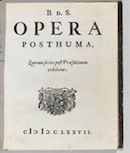
Selection from – Political Treatise - Chapter II, On Natural Right (Page 2)
Spinoza's Words – (self-preservation is the proper goal for each person)

If then human nature had been so constituted, that men should live according to the dictate of reason [then] natural right, as far as mankind is conserned, would be determined by the power of reason only. But men are more led by blind desire, than by reason: and therefore the natural right of human beings should be limited, not by reason, but by every appetite, whereby they are determined to seek their own preservation.
I, for my part, admit, that those desires, which arise not from reason, are not so much actions as passive affections of man. But as we are treating here of the universal power or right of nature, we cannot here recognize any distinction between desires, which are engendered in us by reason, and those which are engendered by other causes; since the latter, as much as the former, are effects of nature, and display the natural impulse, by which man strives to continue in existence. For man, be he learned or ignorant, is part of nature, and everything, by which any man is determined to action, ought to be referred to the power of nature... For man, whether guided by reason or mere desire, does nothing save in accordance with the laws and rules of nature, that is, by natural right.
Comment:
Self-presvation is the criterion that Spinoza sets as the proper goal of human actions. He would perfer that human actions were the result of reason but recognizes that human desires are part of the natural order of things and they have a natural right to exist also.